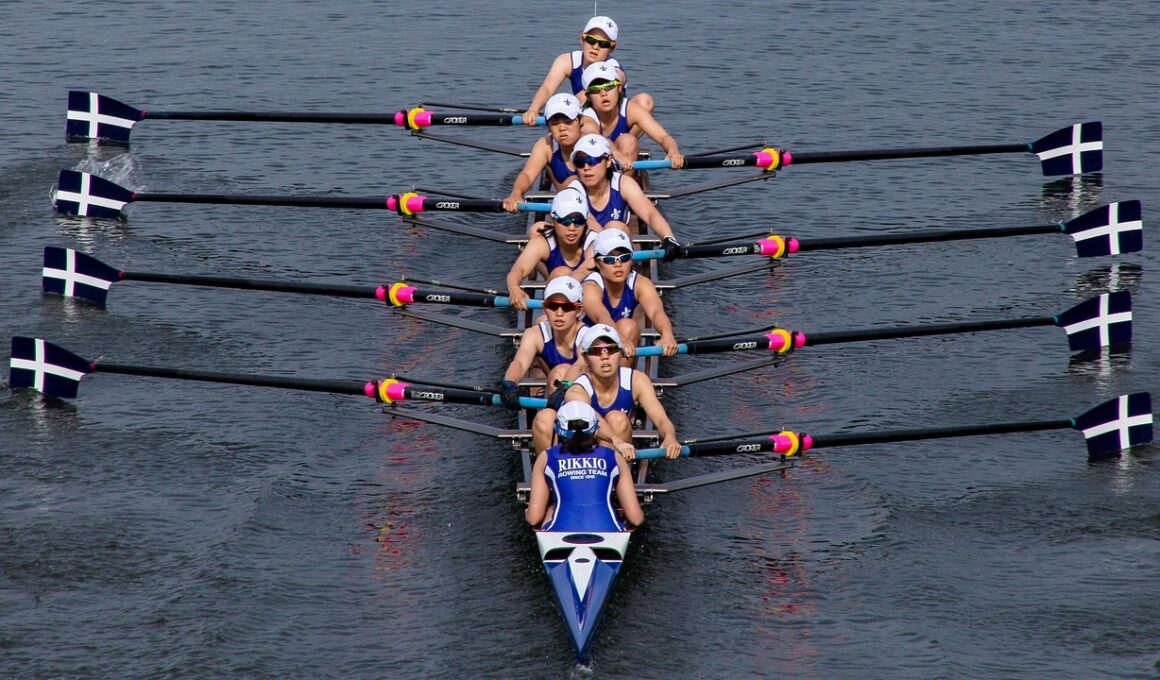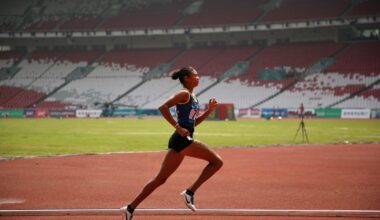Common Mistakes Beginners Make in Rowing and How to Avoid Them
Rowing can be a fulfilling sport, but beginners often stumble upon common mistakes which can hinder their progress significantly. Understanding these errors and learning about how to avoid them is essential for anyone looking to excel at rowing. One of the biggest mistakes beginners make is neglecting proper technique. This is crucial in executing strokes that not only maximize efficiency but also minimize the risk of injury. It’s vital to learn how to hold the oar correctly. A fundamental misstep is gripping too tightly, which can lead to fatigue and poor stroke quality. Additionally, beginners may forget about the importance of synchronizing with their teammates, leading to inconsistency in rowing speed and efficiency. Simply put, communication among rowers is key to developing teamwork and synchrony. Taking the time to watch trained professionals and imitating their techniques can be extremely beneficial. However, the most fundamental step towards improving your skills is finding a good coach or instructor. They can provide specific feedback tailored to individual needs. This personalized guidance can be crucial for success and fulfilling your rowing ambitions.
Another common mistake is overlooking physical fitness outside of rowing practice. Beginners tend to think that just rowing will suffice, but that’s not the case. Having a comprehensive fitness routine that includes strength training, flexibility exercises, and cardiovascular workouts will greatly enhance a rower’s performance. A strong core and upper body are crucial for controlling the boat and maintaining proper stroke technique during competition. Prioritize exercises that build these muscle groups like planking, pull-ups, and resistance training. Additionally, nutrition plays a key role in a rower’s success. Beginners may overlook the importance of a proper diet that fuels their workouts and aids recovery. Consuming the right balance of carbohydrates, proteins, and fats will help maintain energy levels and assist in muscle repair. Once you have established this workout regimen, ensure you are consistently following through. Track your progress, and do not shy away from adjusting your workout plan as needed to achieve optimal results. This commitment to overall fitness and health will pay dividends on the water in both performance and enjoyment.
Improper Equipment Usage
Another area where beginners fail is with equipment choice and use. Rowers must understand their equipment, especially the boat and oars. Many make the mistake of not understanding the different types of boats and their specific uses. For instance, sculling boats are different from sweep rowing boats, so knowing the differences is vital. Beginners should also ensure they are using boats and oars that match their skill level. Trying to use advanced equipment can lead to frustration and accidents. It’s also important to ensure that your equipment is well maintained. Failing to check for damages or issues before each outing can lead to problems during practice or competition. Regular checks on oar blades, footplates, and gear will enhance safety and performance. Furthermore, understanding how to adjust the rigging of the boat is essential for comfort and efficiency. If rowers feel discomfort, they should reach out to coaches for guidance on the best configurations for their needs. Knowledge about equipment can vastly improve your experience, allowing for smoother and more enjoyable rowing sessions while minimizing risks associated with improper handling of gear.
Another common mistake is overlooking the importance of mental preparation and focus. Rowing isn’t just a physical challenge; it’s also a mental game that requires concentration and resilience. Beginners may often underestimate the mental aspect, treating it merely as a workout. Building mental resilience is critical, especially during long rows or competitive situations. Developing strategies such as visualization techniques can help in focusing efforts and overcoming obstacles while rowing. Furthermore, rowing can be demanding on one’s emotional state. Beginners often feel overwhelmed by the complexity of the sport, which can lead to increased anxiety and self-doubt. Recognizing these feelings and addressing them through meditation or mindfulness practices is beneficial. Engaging regularly in mental training alongside physical training can lead to enhanced overall performance. This holistic approach fosters a healthier mindset toward challenges and setbacks, allowing for improvements not just in rowing, but in various aspects of life. Lastly, having a supportive community can provide encouragement, helping beginners to avoid common pitfalls by sharing experiences and learning from others’ mistakes.
The Importance of Patience in Progress
Many beginners confuse speed with improvement, which can lead to frustration. Rowing, like any sport, requires time and practice to master. Trying to rush through learning can lead to the development of bad habits and injury. It is vital to adopt a patient mentality that allows for gradual improvement. Focus on mastering each technique one step at a time instead of trying to perfect everything at once. Setting small, achievable goals can make the learning process feel less overwhelming and more fulfilling. For example, a beginner might aim to improve stroke technique before increasing speed or distance. Tracking your progress in a journal can also provide motivation and help see improvements over time. Additionally, seeking constructive criticism and being open to feedback from more experienced rowers can facilitate faster progress, as they can offer valuable insights into common mistakes you might not be aware of yet. Remember, rowing is often a lifelong pursuit. Understand that mastery takes time, enjoy the process, and celebrate small victories. Embracing patience will make the experience rewarding, leading to a more enjoyable journey in rowing.
Equipment failures and injuries are common aspects that beginners tend to overlook. It is essential to understand basic safety protocols and how to respond if things go awry on the water. Many novices may disregard the importance of wearing appropriate personal flotation devices and ensuring that safety equipment is regularly checked. If rowers become complacent about safety measures, it can result in severe consequences on the water. Each outing should begin with a safety briefing, reviewing the gear, ensuring communication devices are functioning, and familiarizing oneself with emergency procedures. It’s equally crucial to practice safe launching and landing techniques to avoid accidents, as sometimes injuries occur during these moments. Understanding how to handle the boat is just as important as rowing itself. That said, if you feel fatigued or are having difficulty, do not hesitate to settle at any calm spot. Resting is vital, rather than pushing beyond your limits, which can lead to overexertion or injuries. Prioritizing safety and appropriate measures will enhance not only one’s experience but also ensure that rowing remains a fun and exciting activity.
Conclusion: Continuous Learning and Adaptation
Rowing is an exciting and dynamic sport that presents a series of ongoing challenges and rewards. For beginners, understanding that mistakes are an integral part of the learning process is pivotal for their growth. Each error has the potential to teach valuable lessons that can propel that beginner toward becoming a competent rower. Embracing the idea of constant improvement will cultivate a growth mindset, allowing novices to explore diverse techniques and approaches with enthusiasm. Subsequently, maintaining an openness to learn from others is essential. Connecting with fellow rowers can lead to powerful exchanges of knowledge and encouragement, which is invaluable during the initial stages. Attending workshops, clinics, or educational sessions can further expand a beginner’s rowing toolkit. Ultimately, rowing is not just about perfecting strokes; it’s about fostering a love for the water, enhancing physical health, and cultivating a community of passionate individuals. Stay curious and maintain that enthusiasm for rowing, and the journey will undoubtedly yield personal fulfillment and enjoyment of this beautiful sport. Balancing competitiveness, camaraderie, and personal achievement is what truly defines success in rowing.


